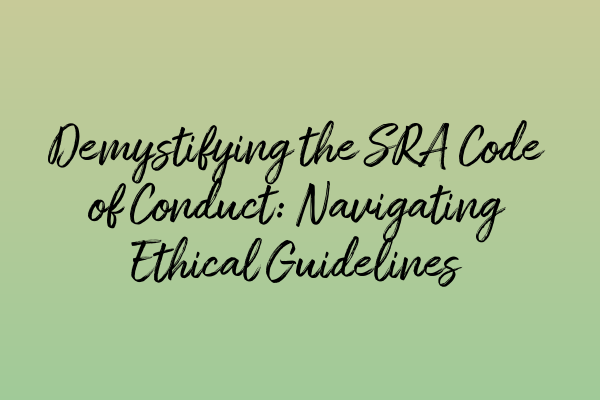Demystifying the SRA Code of Conduct: Navigating Ethical Guidelines
Welcome to our comprehensive guide on demystifying the SRA Code of Conduct! As a solicitor, it is crucial to understand and navigate the ethical guidelines set forth by the Solicitors Regulation Authority (SRA). In this blog post, we will unravel the complexities surrounding the SRA Code of Conduct and provide you with valuable insights that will help you stay compliant and uphold the highest ethical standards in your legal practice.
Understanding the SRA Code of Conduct
The SRA Code of Conduct serves as a framework for solicitors to follow, enabling them to deliver legal services in a manner that is consistent with the principles of professionalism, integrity, and justice. It sets out the standards of behavior expected from solicitors and the ethical obligations they must adhere to. By complying with the SRA Code of Conduct, solicitors can build trust with their clients and maintain the integrity of the legal profession.
While the SRA Code of Conduct includes a wide range of rules and regulations, we will focus on some key areas that are crucial for solicitors to understand:
1. Independence and Integrity
Independence and integrity are fundamental principles that solicitors must uphold when practicing law. This principle requires solicitors to act with honesty, objectivity, and independence in the best interests of their clients. It means avoiding conflicts of interest and maintaining confidentiality with the utmost care. To dive deeper into this topic, you can read our related article on Magistrates’ Court vs Crown Court: Understanding Key Differences.
2. Acting in the Client’s Best Interests
Solicitors have a duty to act in the best interests of their clients at all times. This principle requires solicitors to provide competent, diligent, and timely advice, keeping the client’s objectives and preferences in mind. To ensure you have a thorough understanding of protecting vulnerable witnesses, we recommend reading our related article on Protecting Vulnerable Witnesses in Criminal Trials: Best Practices and Legal Safeguards.
3. Maintaining Public Trust and the Reputation of the Profession
Solicitors hold a position of trust within society, and it is essential to maintain the public’s confidence in the legal profession. This principle requires solicitors to act in a way that upholds the reputation of the profession and inspires public trust. By staying up-to-date with the complexities of UK bail laws, you can enhance your reputation as a trustworthy solicitor. We recommend reading our related article on Unraveling the Complexities of UK Bail Laws to deepen your knowledge in this area.
4. Providing a Proper Standard of Service
Solicitors must provide a proper standard of service to their clients. This principle emphasizes the importance of maintaining clear communication, avoiding undue delay, and being transparent about fees and costs. To master the art of questioning witnesses in cross-examination, check out our related article on Cross-Examination Techniques: Mastering the Art of Questioning Witnesses.
How to Navigate the SRA Code of Conduct
Navigating the SRA Code of Conduct can be a daunting task, but with the right approach, it becomes manageable. Here are some key steps to help you navigate the SRA Code of Conduct effectively:
1. Familiarize Yourself with the Code
Start by thoroughly reading and understanding the SRA Code of Conduct. Take note of the key principles and rules that will impact your practice. The more familiar you become with the code, the better equipped you will be to uphold its standards in your daily work.
2. Seek Guidance and Training
If you are unsure about any aspect of the Code of Conduct, seek guidance from experienced colleagues or consult the SRA’s official resources. Additionally, consider attending training sessions or workshops that specifically address the SRA Code of Conduct to enhance your understanding.
3. Regularly Review and Update Policies
Keep your firm’s policies and procedures up-to-date with the latest requirements of the SRA Code of Conduct. Regularly review and amend your internal guidelines to ensure compliance and ethical behavior at all times.
4. Continuing Professional Development
Stay updated with changes to the SRA Code of Conduct by participating in continuing professional development (CPD) activities. CPD provides opportunities to deepen your knowledge, refine your skills, and stay current on the ethical standards expected from solicitors.
Conclusion
The SRA Code of Conduct is a vital framework that guides solicitors in delivering legal services ethically and professionally. By understanding and navigating the ethical guidelines set forth by the SRA, solicitors can build trust with their clients, maintain the reputation of the legal profession, and ensure compliance with all the relevant regulations.
Demystify the SRA Code of Conduct by familiarizing yourself with its principles, seeking guidance, and staying updated with changes. By doing so, you will be well-equipped to navigate the ethical challenges that arise in your legal practice.
For more information on related topics, we encourage you to explore the following articles:
- Magistrates’ Court vs Crown Court: Understanding Key Differences
- Protecting Vulnerable Witnesses in Criminal Trials: Best Practices and Legal Safeguards
- Unraveling the Complexities of UK Bail Laws
- Cross-Examination Techniques: Mastering the Art of Questioning Witnesses
- Remand in Custody: Understanding Detention Prior to Trial


Leave a Reply